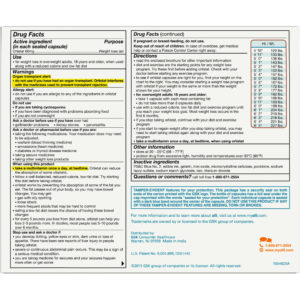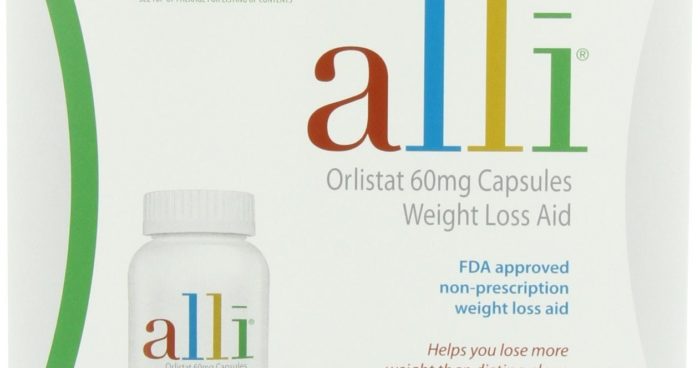Alli is a popular over-the-counter weight loss supplement that claims to help users shed extra pounds when combined with a low-fat, calorie-controlled diet. It is the lower-dose version of Orlistat, a prescription drug known as Xenical, which blocks the absorption of dietary fat in the intestines. The main selling point of Alli is that it offers a non-prescription alternative for individuals looking to lose weight while reducing some of the risks associated with obesity. In this review, I’ll cover how Alli works, its ingredients, benefits, side effects, and whether it’s worth considering for weight loss.
What is Alli?
Alli is an FDA-approved weight loss pill that contains the active ingredient Orlistat, which works by inhibiting the enzyme lipase. Lipase is responsible for breaking down dietary fats in the intestines, and when this process is blocked, approximately 25% of the fat consumed passes through the digestive system without being absorbed. Alli is marketed as a supplement to a healthy diet and exercise plan, and it is intended for use by adults with a BMI of 25 or higher who are looking to lose weight.
How Does Alli Work?
Alli works by preventing the absorption of a portion of the dietary fat you consume. Here’s a step-by-step explanation of how it works:
- Blocking Fat Absorption: When you take Alli, the active ingredient Orlistat inhibits the function of enzymes that break down fats in the digestive tract. As a result, about 25% of the fat you eat is excreted undigested through your stool, leading to fewer calories being absorbed by your body.
- Calorie Deficit: By reducing the amount of fat absorbed, Alli helps you maintain a calorie deficit, which is essential for weight loss.
- Enhancing Diet and Exercise: Alli is most effective when combined with a low-fat, reduced-calorie diet and regular physical activity. It is not a substitute for lifestyle changes but works as a complementary tool to enhance your weight loss efforts.
Key Benefits of Alli
- Clinically Proven to Help with Weight Loss: Clinical studies have shown that Alli users may lose 3-5% more weight over a year compared to dieting and exercise alone.
- FDA-Approved: Alli is the only over-the-counter weight loss drug approved by the FDA, which adds credibility and safety to its use.
- Supports Long-Term Weight Loss: Alli can help with steady, moderate weight loss, making it a potential option for those looking to shed pounds over time rather than through rapid weight loss.
- Helps Reduce Risk of Obesity-Related Conditions: Weight loss achieved through Alli can help lower the risk of health conditions related to obesity, such as type 2 diabetes, high blood pressure, and heart disease.
Potential Side Effects
While Alli is generally safe, it can cause some uncomfortable side effects due to the way it affects fat digestion. Common side effects include:
- Gastrointestinal Issues: Since undigested fat passes through the intestines, many users experience oily or loose stools, gas with discharge, and frequent bowel movements. These effects are more likely if users consume a high-fat meal while taking Alli.
- Nutrient Malabsorption: Because Alli blocks fat absorption, it can also reduce the absorption of fat-soluble vitamins (A, D, E, and K). To counteract this, it is recommended to take a multivitamin containing these vitamins at least two hours before or after taking Alli.
- Rare Liver Damage: In very rare cases, Orlistat has been associated with severe liver injury. Symptoms such as jaundice, dark urine, and persistent fatigue should prompt users to seek medical attention immediately.
Who Should Consider Using Alli?
Alli is most suitable for individuals who:
- Have a BMI of 25 or higher and are looking for a safe, FDA-approved weight loss aid.
- Are committed to a low-fat, reduced-calorie diet and regular exercise, as Alli is not effective without these lifestyle changes.
- Want to lose weight gradually, typically 1-2 pounds per week, rather than through rapid methods.
- Do not have a history of digestive disorders or conditions that might be aggravated by the effects of fat malabsorption.
The Company Behind Alli: GlaxoSmithKline
Alli is produced by GlaxoSmithKline (GSK), one of the largest pharmaceutical companies in the world. GSK has a strong reputation for developing high-quality health products, and the fact that Alli is backed by a reputable pharmaceutical company adds to its credibility. GSK is also the manufacturer of prescription Xenical, which contains a higher dose of Orlistat.
Customer Testimonials
Here’s what some users have experienced with Alli:
- “Helped me shed extra pounds”
“I started using Alli along with a low-fat diet, and it has definitely helped me lose the extra pounds. It works best when you stick to a healthy eating plan. The side effects are manageable if you don’t overdo it on the fat.” – Amazon Review - “Be prepared for side effects”
“Alli works, but be warned about the digestive issues. I had some embarrassing moments because of the loose stools. Make sure to follow the low-fat diet they recommend.” – Customer Review - “Modest but steady weight loss”
“After three months on Alli, I’ve lost around 10 pounds. It’s not a quick fix, but if you’re patient and stick to your diet, it can help.” – User Testimonial
Where to Buy and Pricing
Alli is available over the counter at most pharmacies, including Amazon, Walmart, CVS, and Walgreens. A 60-count bottle of Alli typically costs around $50 to $70, which is generally a one-month supply if taken as directed (three times daily with meals).
Final Thoughts: Is Alli Worth It?
From a medical perspective, Alli can be a helpful tool for individuals looking to lose weight gradually in combination with diet and exercise. Its FDA approval offers reassurance in terms of its safety and efficacy, and clinical studies have shown that Alli users can lose more weight than through diet and exercise alone.
However, the side effects associated with fat malabsorption, such as oily stools and gastrointestinal discomfort, can be a deterrent for some users. Moreover, Alli is most effective when users are committed to making lifestyle changes, as it is not a magic pill for weight loss. It’s important to be aware of its limitations, as well as the necessity of taking a multivitamin to avoid nutrient deficiencies.
For individuals who are dedicated to a healthy, low-fat diet and looking for a supplement to support their weight loss efforts, Alli may be a useful addition to their regimen. However, if rapid weight loss is the goal, Alli might not deliver the desired results.
Click to read user reviews on Amazon
Frequently Asked Questions (FAQs)
- How long does it take to see results with Alli?
Most users begin to notice weight loss within 2-3 months, provided they follow a low-fat diet and exercise regularly. - Can I take Alli with other medications?
Always consult your healthcare provider before taking Alli if you are on other medications, as it may interfere with the absorption of fat-soluble vitamins and other medications. - Is Alli safe for long-term use?
Alli is generally considered safe for long-term use when taken as directed, but it’s important to maintain a balanced diet and ensure adequate nutrient intake through supplements.






Dear Sir/Madam,
I had a kidney stone 5 years ago. I was wondering if I can take Alli.
Kind regards,
Frank
Hi Frank,
You should consult your doctor first. I can’t give you any medical advice.
I’ve been taking alli for a few days now and I have not had a bowel movement in almost a week. Any suggestions?